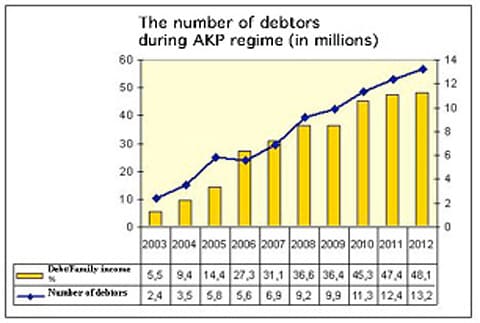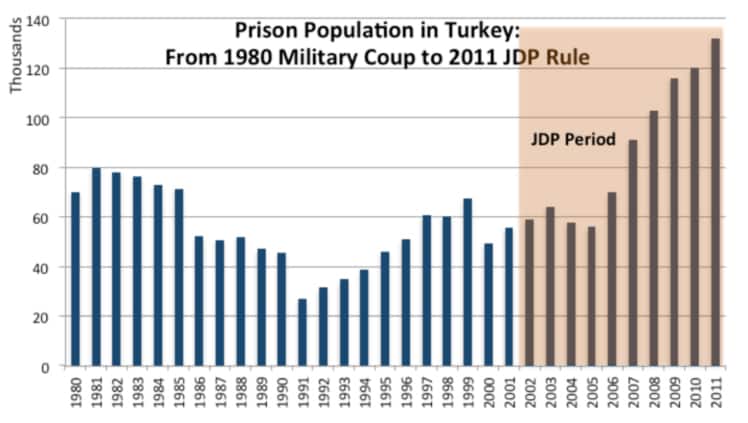Speaking about the then dictator of Nicaragua, US President Franklin Delano Roosevelt reportedly said: “Somoza may be a son of a bitch, but he’s our son of a bitch.” Whether or not Roosevelt actually said it in so many words is disputable, but there is no doubt that it — i.e., dictatorship is licensed in a client state — has been the foreign policy of the United States for years.
Nowadays, the US, together with other Western powers, is taking actions against the Syrian regime, insisting that the regime is a dictatorship that must be toppled. As is well known by now, the US decided to use Turkey for this venture, touting my country as the model of democracy for the Middle East. Even before the “Arab Spring” USAID openly stated that “The United States seeks to develop Turkey as a base for regional leadership on organized crime, counternarcotics, nonproliferation, and counter-terrorism” (USAID, Congressional Budget Justification, 2010, p. 386). Judging by the terrorists’ progress in northern Syria, it is obvious that the Turkish state has become successfully developed as a regional leader in organized crime.
I am sure that Mr. Obama and the oligarchy behind him know that the Turkish regime, too, is a dictatorship and has committed numerous atrocities against its own people. But then again what matters is whether the US owns the dictatorship in question. Had Bashar Assad allowed the US generals to realign the Syrian Army with the US interests, and had he opened his country for US military bases as the regime in Turkey long has, he would have been hosted in the White House and allowed to make a romantic declaration of cooperation with Mr. Obama under the rain. But no.
If a popular unrest is a proof that the government is a dictatorship, we have one right here in Turkey. As of this writing, there is a massive popular uprising in all its major cities. Protests and clashes are ongoing in Ankara, parts of İstanbul, İzmir, Adana, many others. The Ministry of Interior reported that more than 200 incidents took place in 67 cities.
There are many reports and videos explaining what is going on and how it all began. So I won’t repeat them. Rather I will talk about the unseen bottom of this iceberg, whose tip alone may be visible from afar. Because all the people who are now clashing with police out in the streets have had deeper wounds inflicted by the system in Turkey.
For a long time, mass media reports on Turkey have liked to point out the “stabilized and growing economy” of Turkey. It is said that the number of millionaires in Turkey has risen from less than 10,000 to over 50,000 in just 10 years. Rarely could we find, though, articles explaining whose economy they are talking about.
Stabilized and growing. Thanks to whom? Thanks to those groaning under growing debts; thanks to those working harder and longer than their counterparts in any other OECD country; thanks to women, whose unemployment has doubled in ten years; thanks to the 3.5 million Turkish and Kurdish child laborers, half of whom cannot continue their formal education. Their economy has never become stable.
The number of debtors escalated under the rule of the AKP. Economist Mustafa Sonmez observes: “In 2003 there were 2.4 million people with consumer credit debts. By the end of 2012, however, the number of people who owe consumer credit debts to the banks reached 13.2 million.” And here is his graph showing the impact of Turkey’s growing economy upon its people:
It is unfortunate but not surprising that Turkey is considered to have the worst quality of life among the OECD countries. Not surprising for us, because a 2011 study by the Ministry of Family and Social Policies showed that the income gap is huge in Turkey. Only 1.2 percent of the total population make 3,000 dollars or more per month. The bottom 60 percent make less than 35 dollars per day. I will let you imagine the state of the bottom 10 percent.
As a Brazilian president (another dictator) once said: “In my country the economy is doing fine, but the people aren’t.” Indeed.
Whose economic growth and stability, and at whose cost? Historical records have been broken in the prison population during the AKP rule. Possibly because people have no other way of making a decent living in Turkey today than committing crime. But there is another reason: according to an Associated Press survey of “anti-terror” convictions, (many of which are cases of “using the fight against terrorism to curb political dissent”), the AKP’s “Turkey alone accounted for a third of all convictions, with 12,897.” Just to see the big picture, you can have a look at this graph:
Meanwhile, Turkey also ranks top in the number of workplace accidents (or rather industrial murders) in Europe, killing 12,686 in the last 12 years.
I am not saying the protests in Turkey began only because of these economic problems. No, that would be reductionism. But I am also sick and tired of the CNN-style “culture war” theories that paint an illusory “successful-economically-though-politically-restless” image of Turkey.
The issue of politics is a whole other issue. Maybe we can discuss it later. There are comrades now fighting in the streets of my country, and I have many things to learn from their struggle. One of them has posted a memorable Facebook status, and I want to finish with his words, just to give you a general idea about the extent of the fervor and solidarity among the people:
A blind man was shouting, “Please tell me in which direction I should throw this stone!” Two 13-year-old boys were collecting stones, and their parents were throwing the stones at the police in front of the barricade. A 70-year-old man was crying: “Boys, I am not strong enough to throw stones, I wish I died so that you could use my dead body as a barricade.” And all these were taking place under an intense cloud of tear gas.
Eren Buğlalılar may be contacted at <[email protected]>.
| Print


